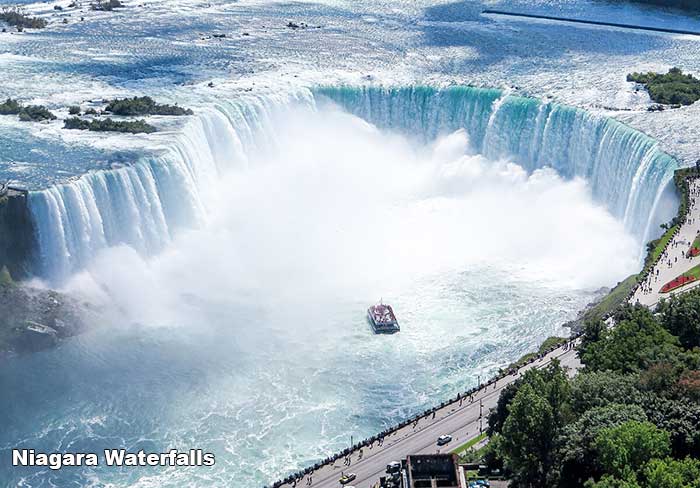
Niagara Falls, one of the most breathtaking natural wonders of the world, straddles the border between the United States and Canada. This iconic landmark attracts millions of tourists annually, drawn by its cascading waters' sheer power and beauty. Comprising three distinct falls – the Horseshoe Falls, the American Falls, and the Bridal Veil Falls – Niagara offers a spectacular sight that has fascinated visitors for centuries.
A Geological Marvel
Formed around 12,000 years ago during the last Ice Age, Niagara Falls is the result of the Niagara River eroding the glacial ice and rock layers. The falls are a part of the Niagara Escarpment, a significant geological formation that extends from New York through Ontario. The relentless force of the water flowing over the escarpment has created a natural wonder that is both awe-inspiring and scientifically intriguing.
The Three Falls
Horseshoe Falls: The largest and most famous of the three, Horseshoe Falls is primarily located on the Canadian side. It boasts a height of about 57 meters (188 feet) and a width of nearly 790 meters (2,590 feet). The immense volume of water rushing over its edge creates a stunning curtain of water that is both powerful and mesmerizing.
American Falls: Located entirely on the U.S. side, the American Falls is approximately 34 meters (110 feet) high and 320 meters (1,050 feet) wide. Unlike the smooth curve of the Horseshoe Falls, the American Falls are characterized by their rugged rock formations, which create a more tumultuous cascade of water.
Bridal Veil Falls: The smallest of the three, Bridal Veil Falls is situated next to the American Falls, separated by Luna Island. It stands at around 24 meters (78 feet) in height and has a width of 17 meters (56 feet). The delicate appearance of this waterfall, resembling a bride's veil, gives it its name.
Tourism and Activities
Niagara Falls has been a popular tourist destination for over two centuries. The area offers a variety of activities that allow visitors to experience the falls up close. The iconic Maid of the Mist boat tours take passengers to the base of the falls, providing an unforgettable perspective of the thundering waters. Additionally, the Cave of the Winds tour on the U.S. side offers an exhilarating walk along wooden platforms that bring visitors within feet of the Bridal Veil Falls.
For those seeking a panoramic view, the Skylon Tower on the Canadian side features an observation deck that offers stunning vistas of all three falls. At night, the falls are illuminated with colorful lights, creating a magical display that enhances their natural beauty. Seasonal fireworks shows add to the nighttime spectacle, making visiting Niagara Falls a memorable experience.
Environmental and Economic Impact
Niagara Falls is a natural wonder and a vital source of hydroelectric power. The falls generate significant amounts of electricity for both the U.S. and Canada, harnessing the energy of the rushing water to power homes and businesses in the region. The careful management of this resource ensures a balance between preserving the falls' natural beauty and meeting energy needs.
The tourism industry around Niagara Falls is a significant economic driver for both countries. Hotels, restaurants, and attractions thrive due to the steady influx of visitors, contributing to the local economy and providing numerous jobs. Maintaining and protecting the falls and the surrounding environment is crucial to sustaining this economic benefit while preserving the area's natural heritage.
Conclusion
Niagara Falls continues to captivate and inspire people worldwide with its incredible beauty and power. Niagara Falls holds a special place in the hearts of many as a geological wonder, tourist hotspot, and renewable energy source. Whether experienced from the misty base or a lofty observation deck, the sight of these majestic waterfalls is an unforgettable experience showcasing nature's grandeur.
#Niagara_Waterfalls





